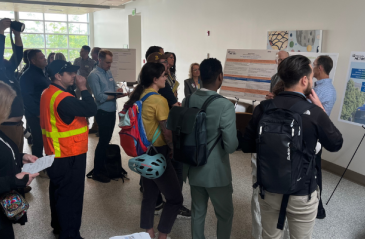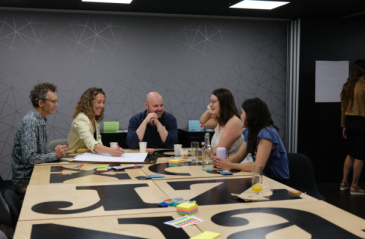
The information barriers holding back climate action and how to break them

Find out how Harrow is pursuing a hugely ambitious personalisation agenda in adult social care
Share articleThere are now 1,000 people empowered to make decisions about their own care in Harrow
Share articleHarrow is now working with IBM Watson Health to implement Watson Care Manager
Share articleWe put our vision for government into practice through learning partner projects that align with our values and help reimagine government so that it works for everyone.
Harrow is a fairly typical outer London borough, distinguished by its diversity, history (with its famous school) and strong family appeal - including low crime, green space and good schools. But now its local authority, facing eye-wateringly large spending cuts, is leading a quiet revolution in health and social care.
Harrow's ambition stems from necessity. With a 90% planned reduction in its main government grant over the next few years, the council is looking to cut half of all the spend it directly controls. That means making efficiencies and cutbacks across every service area, from libraries and parks to social care for children and adults.
As the elected councillor responsible for our finances, I face an ever-worsening budget position - unless, that is, we can generate new revenues by selling additional services on a commercial basis. That's why the other half of my role includes pursuing an ambitious agenda of commercialisation. I look at the talents, skills and capabilities across the council and ask how we can use these to add value for our residents and businesses, as well as potential customers from outside the borough.
Council staff have taken on the challenge with huge energy. We've launched 11 services on a new web platform - www.harrowcommercialservices.co.uk - and are developing others all the time. But in one area of the council's activities, adult social care, it was clear to me and my colleagues that something was happening that had the potential to make an impact globally: the personalisation of social care.
The personalisation agenda in adult social care has been on the radar of every council for a number of years. In essence, it is about ensuring that anyone who receives support - either from government or from private services - has choice and control over the type of care they receive. The reality, however, has fallen short of the hopes and expectations both of political leaders and those who use social care services.
Since 2008 Harrow set challenging year-on-year targets of making personal budgets work in practice - by 2013/14 we were ranked 2nd (out of 152 councils) for delivering “cash” personal budgets. To achieve this, we had to replace the usual operating model of local government with a start-up mentality more commonly found in Silicon Valley. We partnered with a small tech firm to get a live system running as quickly as possible. And we worked every step of the way with social care users themselves, a genuine model of coproduction that was a critical factor in getting the system adopted - and admired - by the people it was designed for.
Today, we have nearly 1,000 personal budgets registered on My Community ePurse (MCeP). That's 1,000 people empowered to make decisions about their own care, coupled with appropriate support, advice and accountability, instead of being told what's best for them.
Aside from outstandingly positive feedback from users, the system has had two major knock-on benefits. First, by opening up user choice beyond the traditional 30 providers selected by government, we were able to create a marketplace that has eventually brought in more than 750 providers. They include everything from day centres to dance teachers, many either independent small businesses or third sector organisations.
Of course, establishing a new marketplace requires some stewardship. We monitor providers carefully and require a minimum standard before they can gain access to the portal. Our coproduction efforts led to our designing a user charter that providers must sign up to, another step to ensure consistency even as we diversify supply.
In return, however, providers get access to a large market of potential customers, along with major benefits from the digital nature of the system, which clears away much of the overhead needed to deal with brokering teams or antediluvian payment processes. Since the payments are all made via PayPal, the financial part of the system is trusted, secure and easy to navigate. The providers also get paid up front - unheard of in the social care market, but essential for small providers with limited ability to manage unpredictable cash flows.
Our system had another major knock-on benefit: savings to the council. Given the efficiency and market access benefits for providers, we were able to ask them to accept discounts on their standard rates, saving on average 7% across our entire community spend. No wonder the NHS, facing similar issues of major budget challenges and the increasing prevalence of chronic conditions, is so keen to make personal budgets a health matter too.
With a digital personal budgets system up and running and in active use by 1,000 vulnerable people, we knew we had created something that could be much, much bigger than Harrow.
That's why, in September this year, we signed a 10-year partnership with IBM Watson Health. The deal brings together the tech might of IBM, the cutting-edge cognitive technologies of Watson, Harrow's experience implementing personal budgets with social care users, and our contacts in the public sector. It is the first agreement of its kind in UK local government and will see the first implementation of Watson Care Manager outside the US.
Under our plans, IBM will enhance Watson Care Manager to enable individuals and caregivers to quickly and easily select the most appropriate provider that can deliver the services they need, using their allocated personal budget. Health and social care providers bid to supply the service and secure the contract, with Watson Care Manager then automating payments to ensure the service has been delivered to the user.
But it's not just a directory of health services and a tool that integrates health and social care, although these are incredibly important innovations in themselves, the system also learns from its users. It can search masses of data in seconds, helping to predict future health risks and offering guidance on the best available care or support.
People said this kind of technology was decades away. But Harrow is making it happen today - and, together with IBM, we'll bring it to the rest of the world by late 2017.
The world is facing challenges to health and social care whose scale is difficult to fathom. Overcoming them will require investment, innovation and a fundamental change in the way we operate. In Harrow, we believe that putting patients and service users in charge will be a core tenet of 21st century care.
Today, that's true for a thousand people in Harrow. Tomorrow, we hope to make it a reality for millions around the world.











